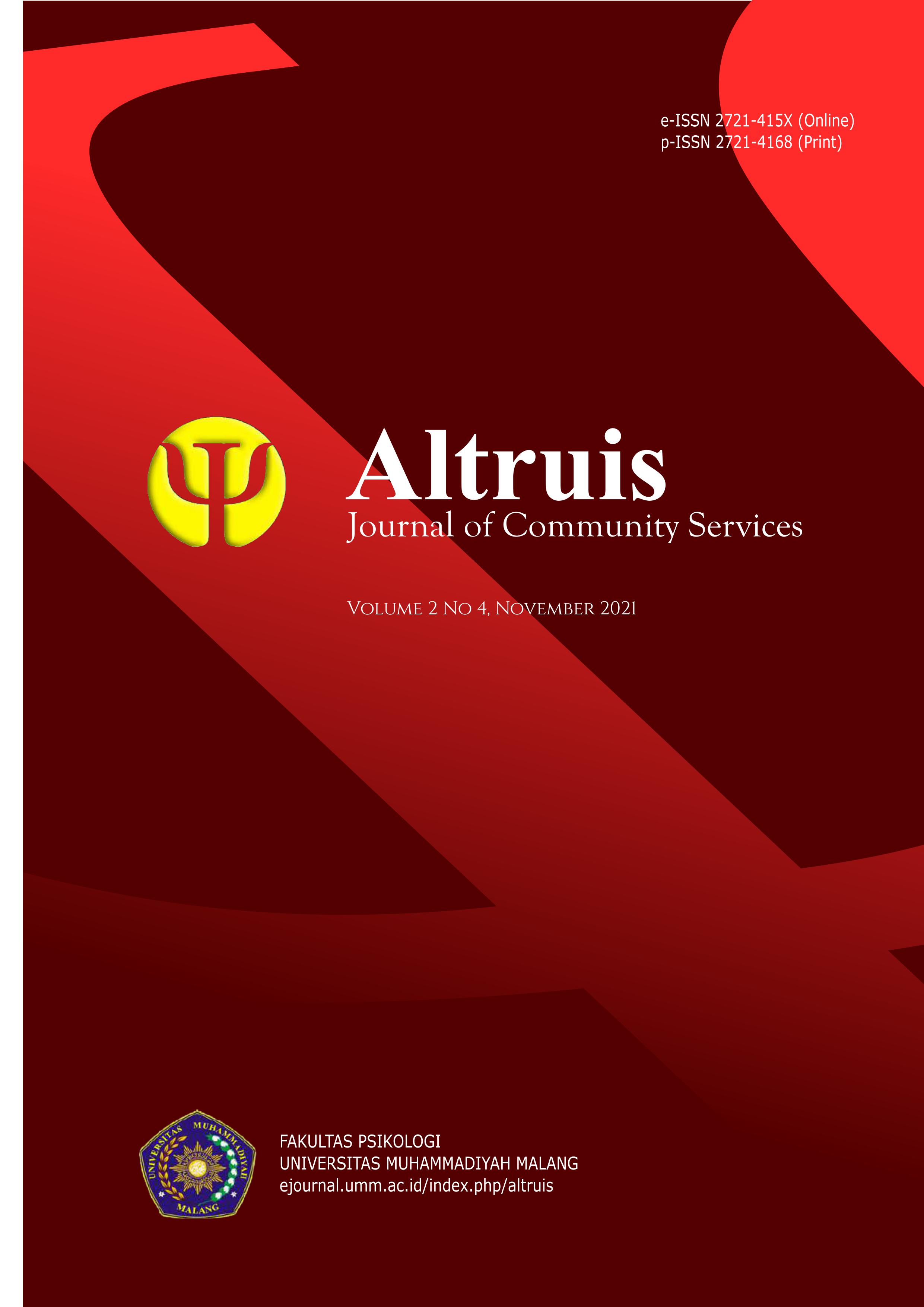CEMARA: Caring and Empathy Luar Biasa untuk Meningkatkan Kompetensi Sosial Guru Sekolah Luar Biasa
DOI:
https://doi.org/10.22219/altruis.v2i4.18400Keywords:
Caring, Empathy, Social competenceAbstract
School Teachers for Students with Special-Needs (STSSN) are not only required to have high cognitive abilities, they must also have a higher level of patience and energy when dealing with students with special needs. In fact, some of them have not been able to respond appropriately the uncontrolled behavior of students with various special needs. The goals of CEMARA (Extraordinary Caring and Empathy) training are enhancing the knowledge, communication skills, and social competences of special school teachers. The training process is carried out using experiential learning with four sessions. The first session is orientation session and training contract, the second session is sharing experiences and explaining knowledge about caring skills and empathy, the third session simulates how to communicate effectively in an empathetic manner, the fourth session ends with reflection and evaluation. Seven teachers of MILB YKTM Budi Asih participated as respondents. The results of this training were the emergence of increased knowledge, communication skills and social skills among teachers. They gained new knowledge about caring and empathy, then they practiced problem analysis and positive communication skills when dealing with various special need students. The improvement of teachers’ social competences is shown by the teachers’ feedback at the end of the training
Downloads
References
Amalia, B. R., Wahyuni, I., & Ekawati. (2017). Hubungan Antara Karakteristik Individu, Beban Kerja Mental, Pengembangan Karir dan Hubungan Interpersonal Dengan Stres Kerja Pada Guru di SLB Negeri Semarang. Jurnal Kesehatan Masyarakat 5, 68–78.
Goleman, Daniel. (2015). Emotional Intelligence: Kecerdasan emosional mengapa EI lebih penting daripada IQ. Jakarta: PT. Gramedia Pustaka Utama.
Kementerian Pendidikan Nasional RI. (2007). Peraturan Menteri Pendidikan Nasional Republik Indonesia Nomor 16 Tahun 2007 tentang Standar Kualifikasi Akademik dan Kompetensi Guru. Retrieved from https://luk.staff.ugm.ac.id/atur/bsnp/Permendiknas16-2007KompetensiGuru.pdf
Kozier. (2010). Buku Ajar Praktik Keperawatan Klinis, Edisi 5. Jakarta. EGC.
Kusnanto. (2019). Perilaku Caring Perawat Profesional. Surabaya: AUP.
Lavy, S., & Naama-Ghanayim, E. (2020). Why care about caring? Linking teachers’ caring and sense of meaning. journal homepage: www.elsevier.com/locate/tate, 2-3.
Listyanawati, Irma. (2015). Peningkatan Kompetensi Dalam Penyusunan Instrumen Peniliaian Berbasis Kurikulum 2013 Melalui Focus Group Discussion (FGD). Jurnal Real Riset, (2), 103-112.
Mayseless, O. (2015). The caring otivation: An integrated theory. Oxford, England: Oxford University Press.
Syarif, H.M. (2011). Pengaruh komunikasi interpersonal dan supervisi kepala sekolah terhadap kinerja guru. Jurnal Media Akademika, 26(1), 125-137.
Undang-Undang Republik Indonesia Nomor 14 Tahun 2005. Guru dan Dosen. Lembaran Negara Republik Indonesia Tahun 2005 Nomor 157. Jakarta. Retrieved from http://www.jdih.kemenkeu.go.id/fulltext/2005/14tahun2005uu.htm.
Downloads
Published
How to Cite
Issue
Section
License
Copyright (c) 2021 Tri Esti Budiningsih, Sugiariyanti, Yogi Swaraswati, Rulita Hendriyani, Arleni, Sotya Paramarta Kerta Yasa

This work is licensed under a Creative Commons Attribution-ShareAlike 4.0 International License.
Authors who publish in Altruis agree to the following terms:
- For all articles published in Altruis, copyright is retained by the authors. Authors give permission to the publisher to announce the work with conditions. When the manuscript is accepted for publication, the authors agree to automatic transfer of the publishing right to the publisher.
- Authors retain copyright and grant the journal right of first publication with the work simultaneously licensed under a Creative Commons Attribution-ShareAlike 4.0 International License that allows others to share the work with an acknowledgment of the work's authorship and initial publication in this journal.
- Authors are able to enter into separate, additional contractual arrangements for the non-exclusive distribution of the journal's published version of the work (e.g., post it to an institutional repository or publish it in a book), with an acknowledgment of its initial publication in this journal.
- Authors are permitted and encouraged to post their work online (e.g., in institutional repositories or on their website) prior to and during the submission process, as it can lead to productive exchanges, as well as earlier and greater citation of published work (See The Effect of Open Access).
This work is licensed under a Creative Commons Attribution-ShareAlike 4.0 International License.


